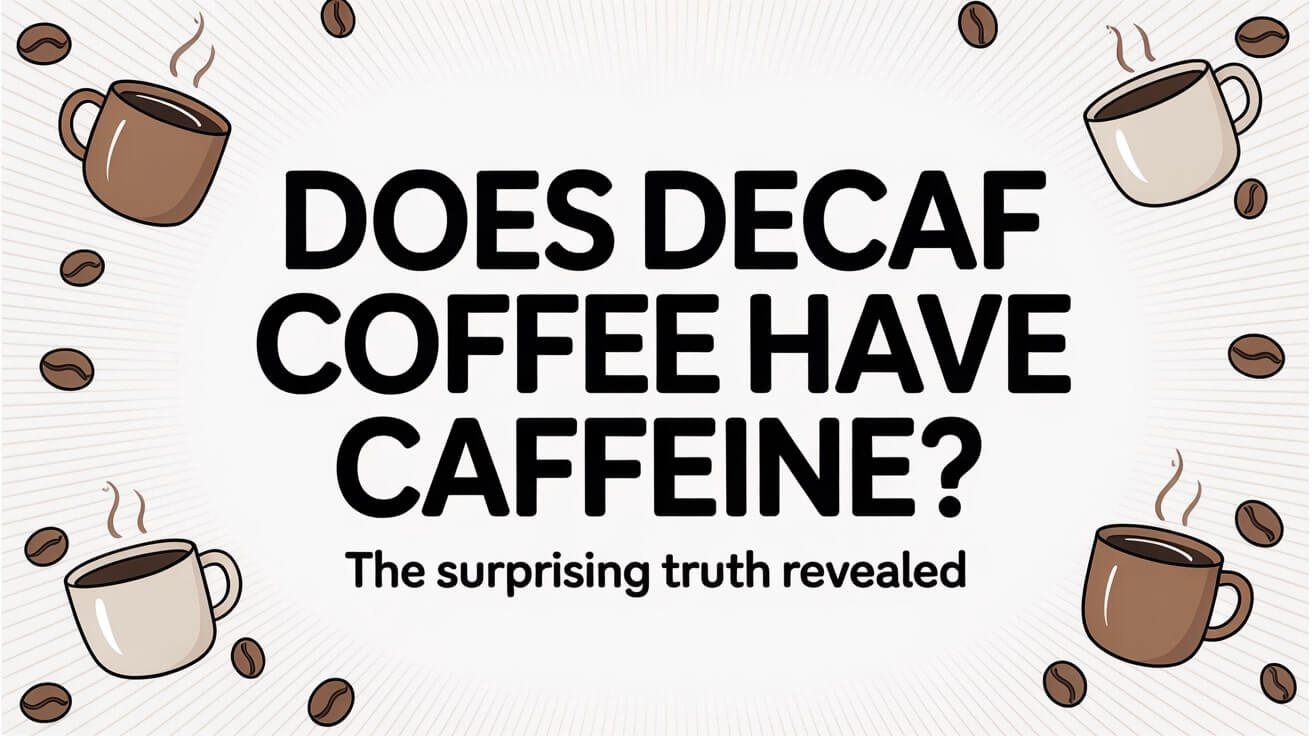
Contents
- 1 Does Decaf Coffee Have Caffeine? Everything You Need to Know
- 2 Best Christmas Cocktails You Will Love
- 3 8 Cozy Coffee Drinks That Burn Belly Fat
- 4 10 Coffee Habits That Kill Your Metabolism
- 5 Coffee Milkshake Recipe for Weight Loss
Does Decaf Coffee Have Caffeine? Everything You Need to Know
For coffee lovers trying to cut down on caffeine, decaf coffee often feels like the holy grail. But as you sip on that steaming cup of “decaf,” do you find yourself asking, “Does it really have zero caffeine?” The short answer? Decaf coffee isn’t completely caffeine-free—but don’t worry, we’ll give you all the details!
This article unpacks everything you need to know about decaf coffee, from how much caffeine it actually contains to how it’s made. Plus, if you’re a coffee fanatic looking to get more out of your daily brew, stick around—we’ll also introduce you to Javar Burn Coffee, a weight loss-friendly coffee that’s as effective as it is delicious.
What Is Decaf Coffee?
Despite what the name might imply, decaf doesn’t mean caffeine-free. Decaf coffee is made from coffee beans that have had most of their caffeine removed. While the process eliminates a big chunk, it’s impossible to extract 100% of the caffeine content.
According to the FDA, an average 8-ounce cup of decaf coffee contains about 2 to 5 milligrams of caffeine. Compare this to a standard cup of regular coffee, which can pack a whopping 95 milligrams, and it’s clear that decaf is a significantly lower-caffeine alternative.
Here’s a simple analogy to keep it fun. Think of regular coffee as the energizer bunny, ready to keep you sprinting all day. Decaf coffee? It’s like the bunny’s chill cousin who helps you stay relaxed without putting you to sleep.
How Is Decaf Coffee Made?
Ever wonder how caffeine gets “decaffeinated”? It’s quite the fascinating process! There are three primary methods used to remove caffeine from coffee beans:
1. The Swiss Water Process
This chemical-free method uses water to gently extract the caffeine from the beans while maintaining their flavor profiles. It’s one of the most popular options for its natural approach.
2. Carbon Dioxide Method
This high-tech method uses liquid CO2 to target and capture caffeine molecules while leaving the flavors intact. Science-approved and taste-approved!
3. Solvent-Based Method
Here, food-safe solvents like ethyl acetate or methylene chloride are commonly used to break down caffeine. The beans are rinsed thoroughly after the process to ensure the coffee is safe and delicious.
No matter the technique, the goal is the same—to retain the complex, delicious flavors of coffee while dialing back the caffeine.
Why Does Decaf Coffee Still Contain Caffeine?
You might be thinking, “Wait, if the goal is to remove caffeine, why isn’t it completely gone?” Great question!
The reason lies in the nature of coffee beans. Caffeine is deeply embedded into their structure, making it impossible to eliminate entirely. At best, the methods we just discussed can remove around 97%-99% of the caffeine content.
This means that decaf coffee is “low caffeine,” not “no caffeine.” If you’re particularly sensitive to caffeine or avoiding it for health reasons, it’s good to keep this in mind.
Benefits of Drinking Decaf Coffee
For those who love the taste of coffee but want to avoid the jitters, decaf offers the best of both worlds. Here are some benefits that make decaf worth a sip (or five):
- Reduces Caffeine Sensitivity: If regular coffee is too stimulating, decaf gives you the comforting flavor without overloading your system.
- Better for Late-Night Sips: Love an after-dinner coffee? Decaf lets you indulge without sabotaging your sleep.
- Same Antioxidants, Lower Caffeine: Decaf coffee retains plenty of antioxidants like polyphenols, which are fantastic for your heart and overall health.
Looking for a Health-Boosting Coffee Alternative? Meet Javar Burn Coffee
If you want the benefits of coffee but with an added wellness twist, you need to know about Javar Burn Coffee. Not only does it offer a smooth, rich coffee experience, but it’s also formulated to support weight loss.
Why Choose Javar Burn?
Here’s what makes it such a unique blend that coffee enthusiasts love:
- Boosts Metabolism: Infused with natural metabolism-accelerating compounds, it helps turn your coffee into a fat-burning powerhouse.
- No Bitter Aftertaste: Whether you like it black or jazzed up with milk and sugar, Javar Burn delivers consistently smooth flavor.
- Compatible with Your Lifestyle: Works seamlessly as part of popular diets like keto or intermittent fasting.
Tasting Notes Included
Like decaf coffee, each pack of Javar Burn comes with expertly curated tasting notes. Whether you detect hints of caramel or cocoa, this coffee will elevate your mornings from basic to brilliant.
For those who thought coffee couldn’t be healthy and indulgent at the same time, Javar Burn is here to redefine expectations.
Click here to try Javar Burn Coffee
Tips for Choosing the Best Decaf Coffee
When shopping for decaf coffee, keep these tips in mind to get the best experience possible:
- Check the Processing Method: If you’re looking for a more natural option, opt for brands using the Swiss Water Process.
- Read Reviews: Consumers often leave valuable feedback about flavor and performance, especially if you’re venturing into premium decaf options.
- Pair It with Your Routine: Love a creamier texture? Choose medium or dark roasts to complement add-ins like milk or non-dairy creamers.
The Bottom Line
Yes, decaf coffee does contain a small amount of caffeine, but for most people, it’s a fantastic way to enjoy coffee without the buzz. Whether you’re cutting back for health reasons or just want a post-dinner treat that won’t keep you awake, decaf has your back.
And if you’re looking for a coffee experience that goes beyond flavor, Javar Burn Coffee is worth a try. Packed with weight loss benefits and rich, smooth flavor, it’s the perfect cup to kickstart your mornings or fuel your productivity.
Ready to elevate your coffee game? Sign up for Javar Burn Coffee today and taste the difference.
Read More: Does Coffee Raise Blood Pressure? What You Need to Know
This post may contain affiliate links. Please read our disclosure here.
Related posts:

Hello, my name is Mary. I’m a passionate food and drink enthusiast, sharing flavorful recipes, creative drinks, and culinary inspiration from around the world. With a love for exploring new tastes and traditions, I bring a mix of easy-to-follow guides and expert tips to make every meal an adventure. Follow along for delicious discoveries and a toast to positive living!




